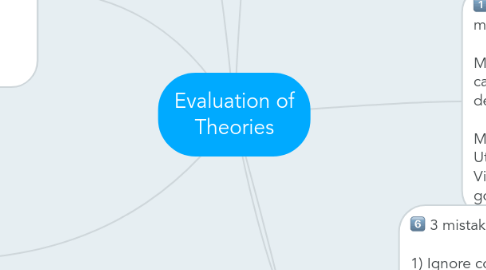Evaluation of Theories
by Anna Bromely

1. Ethical outlook Anybody who is going to live a genuinely worthwhile/fully human life will have to have set of views about central Q's concerning value: -What is life worth living and dying for -What is really admirable and what is really contemptible -What we must do at all costs and not do no matter what Views should be explicit, run deep, sincerely and passionately held. Considered, rationally defensible and as coherent as possible. Credible ethical outlooks are known by recognition rather than definition - this is depended upon how the world is.
2. Why is murder wrong? Consequentialists - deprives person of future Virtue Ethicists - Act of injustice NL theorists - Violation of the good NL2 - Violation of good which is a human person All of these miss a basic point - not so much of taking something away but the taking away of the someone.
3. Glory as an ethical ideal Definition: Spectacular performance within a worthwhile form meets the admiration that it merits. The good and the pleasure (e.g. the glorious performer)
4. From Good/Bad to Right/Wrong That an action would be murder is a basic explanation of its badness, if there are no mitigating factors of special circumstances it is basic explanation of its wrongness.
5. There are opposed schools in moral philosophy like sects Moral theories do not force a decision. It cannot settle major moral issues like end-of-life decisions, abortion, infanticide Moral theory tends to look for the master factor. (E.g. Utilitarians: Utility, Kantians: Universalisability, Virtue Ethicists: Virtues, Natural Lawyers: respect/non-violation of basic goods.
6. 3 mistakes of moral theory 1) Ignore context 2) Ethics should be like science 3) Moral theory can capture everything Confusion of theoretical idealisation with description of reality. Theory exhibits a reductive/simplifying drive. Moral theories offer nothing on 4 key elements: motivation, deliberation, explanation, prediction Motivation: Moral theories leave out love! Deliberation: Nothing to say about desire? Explanation: Do not include the truth about what is good/right to do and why Prediction: Hypothetical correlate of explanation. Theories have an overambitious explanatory pretension One reason for failure is it attempts to emulate science. In ethics the equivalent of data are perceptions
7. Interiority Chappell calls for an ascent into inwardness. If right decisions cannot be generated by formula, no chaotically, they will have to come from within. The only way to make reliably good decisions will be to be or become a good person, not change our practical techniques, but ourselves. Key Question: How should life be lived?


